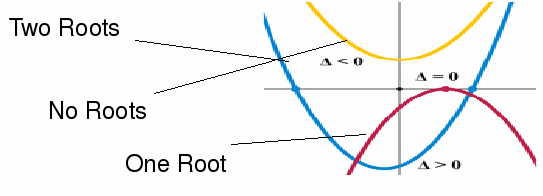The solutions of a quadratic equation![]() are given by
are given by![]()
In order for the equation to have real solutions, we must have that![]() since we cannot take the square root of a negative number to obtain a real number. This means that if
since we cannot take the square root of a negative number to obtain a real number. This means that if![]() the equation has no real solutions. If
the equation has no real solutions. If![]() there are solutions, given by
there are solutions, given by![]() Obviously these two solutions are the same
Obviously these two solutions are the same
If b^2 -4ac >0 then the solutions are distinct, given by![]() and
and![]()
The expression![]() is called the discriminant and the number of solutions of a quadratic is determined solely by whether it is positive, negative, or zero. It is often labelled
is called the discriminant and the number of solutions of a quadratic is determined solely by whether it is positive, negative, or zero. It is often labelled![]() The number of roots, and their significance on the graph of the quadratic, is illustrated in the graph below.
The number of roots, and their significance on the graph of the quadratic, is illustrated in the graph below.

Notice that if there are no roots, the graph doesn't cross the x – axis at all.
If there is one root, the graph touches the x – axis (at one point) but doesn't cross it.
If there are two roots, the graph crosses the x – axis in two separate places.
Suppose that![]() the discriminant is
the discriminant is![]() so the equation has no solutions.
so the equation has no solutions.
